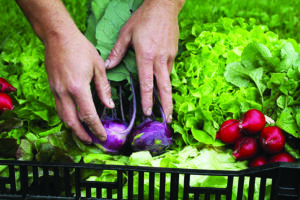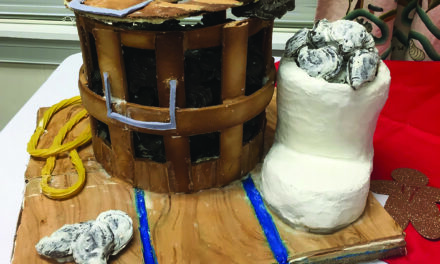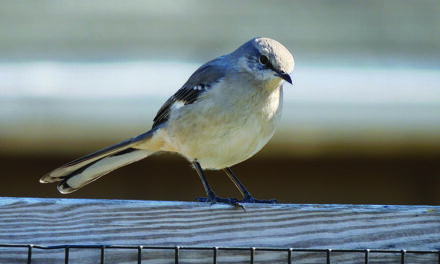
When you are prepared to nurture your victory garden, you will be able to supply your family with fresh, nutritious fruits and vegetables for months to come. (Photo courtesy Sterling College)
During World War I, Americans were encouraged to produce as much of their own food at home as a way to combat shortages and support the war effort.
These “victory gardens” were a way for families to supply themselves and their neighbors with fresh produce during a frightening, uncertain time in our nation’s history. The tradition of victory gardens continued in World War II, and has made a comeback in 2020.
The COVID-19 pandemic has reminded us that nothing is guaranteed, as bare shelves at the grocery store were a stark contrast to the “Amazon Prime” culture many of us have become comfortable with.
And so, as our parents, grandparents, and great-grandparents before us have done, we headed to our patios, balconies, and backyards with spades and seed packets in hand.
In the midst of madness, we found solace in the soil.
If you are one of the many novice gardeners that have found this new passion as a result of the pandemic, you must now ensure your victory garden is indeed victorious.
You have been tasked with scouting out potential issues and pests that may threaten your precious plants.
Some of the most experienced “Garden Scout Masters” can be found at your local Extension office, and they are here to help you earn the merit badges of a successful gardener!
Hydration Hero
Eastern Shore summers can be brutal — high humidity levels, soaring temperatures, and periods of drought can do in an untended garden quickly. To earn this badge, you will need to ensure your plants are getting adequate water. Rachel Rhodes, Horticulture Associate Agent and Master Gardener Coordinator with University of Maryland Extension’s Queen Anne’s County office, strongly recommends consistently watering at the base of your plants via a soaker hose. Traditional sprinklers experience water loss due to evaporation, and get more water on the foliage than the base of the plant. This can cause issues that you will tackle with your next merit badge, the Fungi Foe.
Fungi Foe
The aforementioned Eastern Shore summers are as much of a hotbed for fungus as are a sweaty pair of sneakers in a middle school gym locker. You must be vigilant and inspect your plants for signs of fungus, such as brown spots on the leaves, wilting foliage, rotten roots or stems, moldy growths on your corn, or fuzzy patches on the leaves of your plants.
If you notice any of these things but are unsure of how to address the issue, take a few photos and then head to https://extension.umd.edu/learn/ask-gardening. This is just one of the fantastic resources available on the University of Maryland Extension’s Home and Garden Information Center. Jon Traunfeld, a fruit and vegetable specialist serving as director of the HGIC, explained that “any resident can send us questions [or] problems plus 3 photos and our experts will respond within 48 hours.” Free, fast, expert advice from the comfort of your lawn chair- you can’t beat that!
Pest Patroller
When you have a fruitful garden, you won’t be the only one to notice. Pests like aphids, earworms, and Japanese beetles may try to set up camp on your plants. Are you prepared to prevent and/or eliminate them? Walking your garden daily and inspecting your plants for chewed edges, holes in the middle of leaves, little patches where insects have laid eggs, and wilted leaves are some signs of an insect infestation. Visiting the following link https://extension.umd.edu/hgic/topics/vegetable-insect-mite-pests will help you identify exactly what is pestering your plants and develop your plan of action for eliminating them.
pH Pro
If you planted your garden in a spot in your lawn that you cultivated, it would be wise to have a soil analysis done by one of the many labs in our region. A soil analysis will cost about $10-15 plus shipping, and will reveal your soil’s pH, phosphate, potassium, and magnesium levels.
The lab will also provide recommendations on how you can amend your soil with fertilizer, lime, compost, etc. Emily Zobel, agent associate with the Dorchester County Extension office, suggests calling your local extension office and ask if they provide soil analysis services, or if they have a particular lab to recommend.
If you planted your garden in containers on your deck, patio, or balcony, the potting soil you used was most likely already at optimum levels for plant growth.
Zobel suggested using five-gallon buckets with holes drilled in the sides and/or bottom for drainage. These DIY planters are economical, save space, and are easy to put away when no longer in use. Be mindful, though, that as the water drains out it is taking nutrients with it.
Traunfeld said he recommends fertilizing the soil in these buckets to maintain their nutrient levels.
Weed Walloper
It can be very frustrating to see your freshly cultivated garden turn into a haven for weeds. Within what seems like days, crabgrass, sedge, and a host of others can invade.
Amending the pH of your soil can help keep weeds at bay, since most prefer acidic soil. Routine weeding by hand, in addition to using a hoe, garden weasel, tined cultivator, or tiller will help exponentially. If you don’t have a tiller, you can rent one from a local hardware store for a small fee.
Succession Star
When those cucumbers or zucchini start petering out, you may want to plant something in their place that will help keep that crisper drawer full as summer transitions into fall. Rhodes recommends checking out the planting dates guide on the HGIC site (https://extension.umd.edu/hgic/topics/when-plant-vegetables-maryland). Whether you choose to plant from seed or transplant is up to you, but Rhodes strongly recommends that those new to gardening “spend the extra $2-3 and buy a healthy transplant” from a local nursery or garden supply store, she said. Buying local is good practice for a multitude of reasons, but the staff will most likely be very knowledgeable about the plants they are selling and will be able to help you make the best choice.
The Scout motto is “Be Prepared,” and that certainly applies to gardening as much as it does to knowing how to tie a bowline knot or start a campfire.
When you are prepared to nurture your victory garden, you will be able to supply your family with fresh, nutritious fruits and vegetables for months to come.





